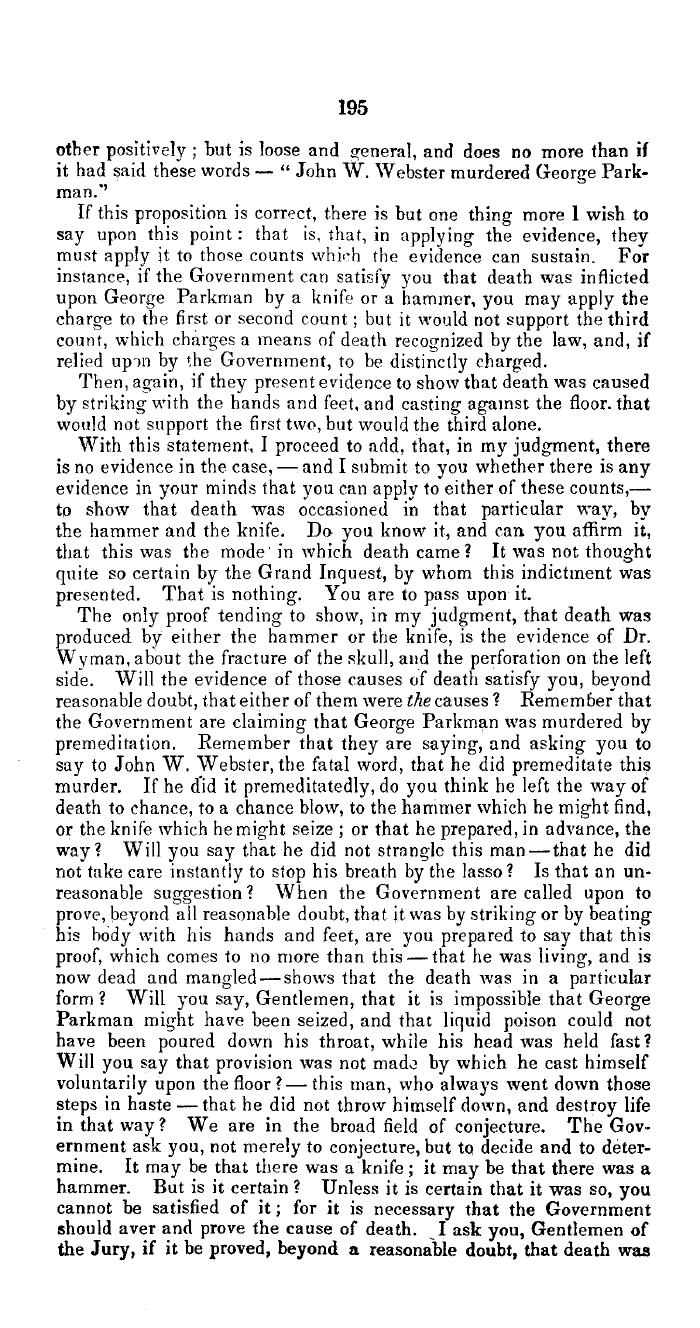|
195
other positively ; but is loose and general, and does no more than if
it had said these words -'1 John W. Webster murdered George Park-
man."
If this proposition is correct, there is but one thing more I wish to
say upon this point : that is, that, in applying the evidence, they
must apply it to those counts whi,,h the evidence can sustain. For
instance, if the Government can satisfy you that death was inflicted
upon George Parkman by a knife or a hammer, you may apply the
charge to the first or second count ; but it would not support the third
count, which charges a means of death recognized by the law, and, if
relied up-)n by the Government, to be distinctly charged.
Then, main, if they present evidence to show that death was caused
by striking with the hands and feet, and casting against the floor. that
would not support the first two, but would the third alone.
With this statement, I proceed to add, that, in my judgment, there
is no evidence in the case,-and I submit to you whether there is any
evidence in your minds that you can apply to either of these counts,-
to show that death was occasioned in that particular wav, by
the hammer and the knife. Da you know it, and can you affirm it,
that this was the mode in which death came? It was not thought
quite so certain by the Grand Inquest, by whom this indictment was
presented. That is nothing. You are to pass upon it.
The only proof tending to show, in my judgment, that death was
produced by either the hammer or the knife, is the evidence of Dr.
Wvman, about the fracture of the skull, and the perforation on the left
side. Will the evidence of those causes of death satisfy you, beyond
reasonable doubt, that either of them were the causes? Remember that
the Government are claiming that George Parkman was murdered by
premeditation. Remember that they are saying, and asking you to
say to John W. Webster, the fatal word, that he did premeditate this
murder. If he did it premeditatedly, do you think he left the way of
death to chance, to a chance blow, to the hammer which he might. find,
or the knife which he might seize ; or that he prepared, in advance, the
way? Will you say that he did not strangle this man-that he did
not take care instantly to stop his breath by the lasso? Is that an un-
reasonable suggestion? When the Government are called upon to
prove, beyond all reasonable doubt, that it was by striking or by beating
his body with his hands and feet, are you prepared to say that this
proof, which comes to no more than this-that he was living, and is
now dead and mangled-shows that the death was in a particular
form? Will you say, Gentlemen, that it is impossible that George
Parkman might have been seized, and that liquid poison could not
have been poured down his throat, while his head was held fast?
Will you say that provision was not mado by which he cast himself
voluntarily upon the floor?-this than, who always went down those
steps in haste-that he did not throw himself down, and destroy life
in that way? We are in the broad field of conjecture. The Gov.
ernment ask you, not merely to conjecture, but to decide and to deter-
mine. It may be that there was a knife; it may be that there was a
hammer. But is it certain ? Unless it is certain that it was so, you
cannot be satisfied of it ; for it is necessary that the Government
should aver and prove the cause of death. I ask you, Gentlemen of
the Jury, if it be proved, beyond a reasonable doubt, that death was
|

